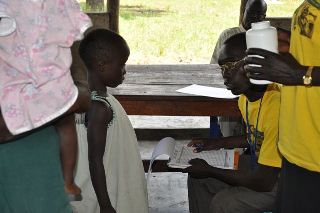USAID, Malaria consortium launches mass drug treatment in S. Sudan
By Julius N. Uma
June 29, 2011 (JUBA) – United States Agency for International Development (USAID) has officially launched a program of mass drug treatment for bilharzia and intestinal worm infections in Yei County, Central Equatoria state (CES).

Statistics from recent mappings, according to health officials, indicate that the four targeted counties of CES have a combined prevalence rate of 34% and 53% for bilharzia disease and intestinal worm infection respectively.
Already, the state health ministry and county health departments are said to be working in partnership with Malaria Consortium to make this campaign a success, all courtesy of funding and technical support from USAID and the United Nations Children’s Fund (UNICEF).
“All community members will be treated for bilharzia/schistosomiasis and intestinal worms during MDA days in their communities and the drugs will be provided free of charge and administered by members of the County Health Departments and trained volunteers,” partly reads a USAID statement.
To-date, according to health officials, communicable diseases remain the most common causes of illness, disability, and death in South Sudan; a region reportedly plagued by 12 different endemic diseases. However, bilharzia and intestinal worms are said to be two of the most neglected tropical diseases in semi-autonomous region.
“Long-term infection with bilharzia can lead to undetected immune problems and cancer. Intestinal worms’ infection can reduce the growth of children and cause excessive fatigue,” the statement adds.
A total of 1.4 million Praziquantel tablets were distributed to an eligible population of 477,000, while 200,000 tablets of Albendazole were given to 530,000 school children in the four targeted counties.
(ST)
